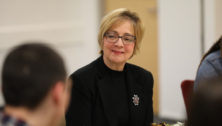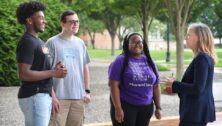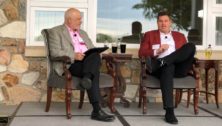Delaware County Leadership: Ellen Langas, President and Founder, NouSoma Communications
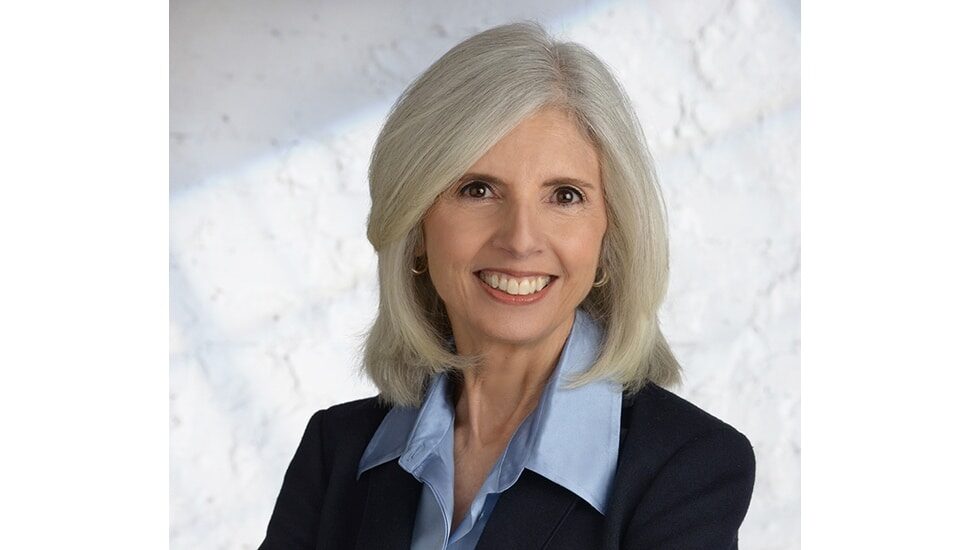

Ellen Langas, a Haverford resident and founder and president of NouSoma Communications, Inc., spoke to DELCO Today about growing up in the Pittsburgh suburbs and later living and starting her company in Chester County. Born to Greek parents, her early years were a slice right out of the movie My Big Fat Greek Wedding.
She moved to Chester County in the eighties after working for Westinghouse and Corning Glass Works, then worked for the Eagle’s Eye, founded by brothers Chris and Bob Burch.
In 1986, on a whim, she responded to an ad to audition at a new start-up. From thousands of hopefuls, Ellen was hired as one of the first 100 employees and an original program host at QVC, where she later became the company’s national consumer spokesperson and Vice President of public relations, one of only two female C-suite executives at the time.
Hers is still the voice of QVC’s automated ordering system, and she has performed hundreds of TV and radio commercials throughout her career.
Ellen is also the accomplished author of the award-winning Girls Know How® book series. We discussed her youth, her career path, and how being raised to be seen and not heard informed her vision to empower girls and women to explore and pursue the careers of their dreams, without limitations set by others.
Where were you born, and where did you grow up, Ellen?
I was born the second of two daughters in Pittsburgh and lived there until I was four, when my family moved to the small town of Moon Township, just west of the city.
What did your parents do?
My dad was the director of the physical plant at Robert Morris College. My mom had worked for the Pittsburgh Board of Education, but when she became pregnant, her employer asked her to stop working, as often was the case in those days.
What memories stay with you from growing up in Moon?
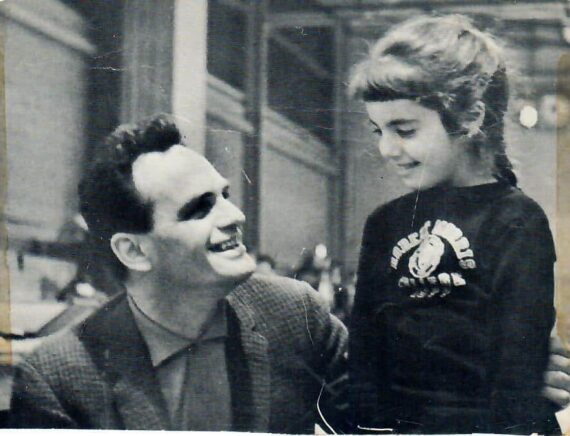
We grew up in the caretaker’s home at the bottom of Pine Hill Manor estate, which was where the Robert Morris campus was being developed. So, while we had very modest means, to me, it was the ultimate kids’ playground. There were apple orchards, rolling hills, and spooky pine tree woods. We would play outside all day.
While that part of living on the campus was terrific, it was awkward when I got older and attended college where my dad worked.
Did you play any sports when you were young?
In high school, I lettered in gymnastics, swimming, and tennis. In college, I was captain of the tennis team.
Of those three sports, what were you best at?
While I had an awesome serve, my tennis record wasn’t notable. I was probably better swimmerꟷparticularly freestyle and backstroke. We won several championships. Looking back, I realize you learn so much playing organized sports that translate to running a company.
What part-time jobs did you have in high school and college?
I took piano lessons when I was young, and when I was 15, I started teaching children’s piano lessons. I would do up to 12 or 13 lessons a week. I did that throughout college to earn enough money to buy a car. I picked an awesome red Sunbird, but my dad put his foot down and I ended up with a Volare with awful paisley vinyl seats. I still get grief about that from my friends. Then, I worked as a lifeguard, a tennis court attendant, temp secretary, and a waitressꟷall the odd jobs available in small towns.
What lessons did you learn from teaching piano or those odd jobs you had that stay with you today?
One is to recognize your talents and draw on them. And I had to figure out how to organize because I was juggling coursework, sports, and family life.
I also gained some confidence as a lifeguard. I was shy and a little awkward, but as a lifeguard, I learned that one piercing look and a shrill whistle could stop a kid in their tracks!
When was the first time you realized you could lead and people would follow you?
It happened at Robert Morris College, which today is a well-respected university.
While I’m sure my sister and I could have been accepted at other colleges, we attended Robert Morris because my father’s job as director of the maintenance department provided us with that benefit. My parents encouraged us to get Associate Degrees and become secretaries so we could be independent. But I hoped for more.
While I was in college, I was introduced to a new organization called SIFE, which today is known as Enactus. The concept was that students teach business principles and entrepreneurial skills to others to improve their standard of living and quality of life.
Dean John Basset, whom I’ve always held in high esteem, invited me and another student to attend a SIFE orientation session to help decide if the college should start a SIFE. I was inspired. It was the first time I felt like, ‘I get this whole idea of capitalism and entrepreneurship.’ We started a campus SIFE program, and I was asked to lead it. Within one year, we built the team, did several outreach projects, and interacted with other businesses, students, and organizations. This is where I learned about leadership and the importance of good communication skills. We won first place in the national competition out of 80 colleges around the country.
That experience has been a big motivator for me to practice service leadership and pay forward lessons learned. In particular, it helped me lay the groundwork for starting Girls Know How and Kids Know How.
What about music? What floated your boat music-wise?
I didn’t have many records, but I loved listening to the radio. I liked Queen, Annie Lennox, Janis Joplin, and The Eagles. Eric Clapton and Bonnie Raitt are a few other lifelong loves. I can’t sing to save my life, but I won a lip-syncing contest doing “Would I Lie to You?” by Annie Lennox.
My parents were huge opera fans, so we listened to opera in the house all the time. You either hate it or love it, and I love it. Turandot and Madame Butterfly are two of my favorites. Music like that bridges generations.
You said you went to Robert Morris – did you look at any other schools?
I didn’t have the opportunity to look at other colleges. Living at home, I did miss a bit of college life, but made up for that in grad school. I graduated first in my class and summa cum laude from Robert Morris, so was fortunate enough to get a scholarship to the University of Pittsburgh’s Katz School of Business.
Why Pitt? You could have gone anywhere?
The University of Pittsburgh remains a top school in the nation and was the only school I applied to. I loved that they offered an eleven-month program because I was eager to get started in the working world. I connected with a community of like-minded people there, and we remain very close. My daughter, Stephanie, attended Pitt for undergrad and graduate school as well.
Looking back over your career, who were the people who saw promise in you, opened doors, and gave you opportunities?
At my first marketing job at Corning Glass Works, my boss, Paul O’Connor, realized he had someone with potential but who was very naïve about the way business worked. While I had the education, I had never been away from home or lived on my own. I appreciated how he helped me learn from my mistakes, and I was motivated because he expected a lot from me.
Then, in 1986, I read an article in the newspaper that asked, “Do you want to be a TV host?” So, during my lunch hour, I went on this audition where I had to sell a pencil for five minutes on a video. I was shocked to get a callback for a second audition and then offered the job.
It was an adventure. None of the hosts had TV experience, so we helped each other and became such close, lifelong friends. I had so much respect for Joe Segel, the founder and CEO, because he had amazing focus and a philosophy of always delighting the customer. After learning about my marketing background, Joe asked me to develop a consumer affairs department.
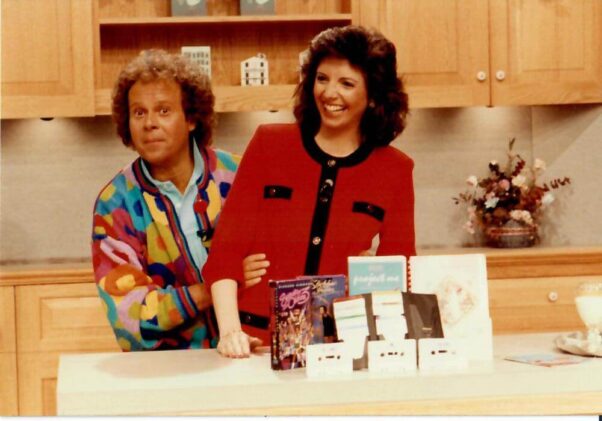
Joe never knew he was my mentor, but in my mind, he was. I mirrored a lot of his philosophies. Because QVC didn’t have a PR department, I recommended that I start one and presented a detailed proposal, which he promptly acknowledged and declined. Whether foolhardy or not, I moved forward with the plan anyway. I started a media contact list, started interacting with media members, and the next thing you know, I was vice president of public relations. Sometimes, you have to just go for what you want.
There’s one more thing I’d like to add about people in my life who helped me get where I am todayꟷmy daughters are so important to me. I was a single mom for years. Even now that they’re grown up, we’re close and help lift each other up.
And at NouSoma Communications, my leadership team is wonderful. Kristen Stewart and Dede Crough are among the best in the business, and I feel so fortunate to work with them.
What motivated you to start your own full-service marketing agency, Ellen?
It was twofold. In 1993, I had a challenging second pregnancy. I had to take time off work and lie flat on my back for four months. After I gave birth, both my baby and I needed special care. I had to relearn to walk and had lost the use of my right hand.
At the same time, while I was on leave, Barry Diller acquired QVC, and the majority of officers moved on, so the writing was on the wall. Diller had already brought in a whole new marketing team. While they offered that I could return to hosting, marketing and public relations were where my heart was.
So, after my daughter and I recuperated, I launched NouSoma Communications in my basement. I offered free press releases to some local companies, they were well-received, and I gained some clients. The smaller clients grew into bigger ones. We built the entire company through word-of-mouth and referrals. Since then, and nearly three decades later, we’ve become a well-respected, full-service marketing, public relations, and branding agency with regional and national accounts.
What would you like NouSoma to be known for?
We believe that every company and every person has a story to tell, and it’s our job to bring it to life and share it.
I coined the word “NouSoma” because “nous” is the Greek word for mind, and “soma” is the Greek word for body, so it represents collaboration and balance. We try to bring that philosophy to every client we work with.
Founded in Chester County in 1995, we’re a full-service marketing, public relations, and branding firm rooted in a culture of empowerment and committed to being engineers of positive change. We serve Chester County and the five-county region, as well as national clients, and we have developed several brands that appear on QVC.
We’ve just come through a difficult business period. What challenges and opportunities are you facing going into the new year?
We are energized by the growth and vitality we see in our existing and new clients as well as our business. That may be due to the demand and growing value placed on innovative and integrated communications, of which we are proponents. That could be in the form of layering press releases, digital marketing and geo-targeting, video production, high-impact media appearances, e-newsletters, annual reports, and more. The key is consistent messaging that resonates with diversified audiences and utilizing the communications channels that meet people where they are.
In terms of challenges, I’m concerned about the after-effects of the pandemic, which has shifted people from working together to working isolated from home. I’m concerned about the lack of mentorship available to younger workers who may not be able to interact with seasoned leaders. We are already seeing a change in communication skills reflected in the people we interview for positions.
Tell me more about ‘Girls Know How’?
One thing I didn’t have growing up was guidance, particularly career guidance. And I couldn’t picture myself in many roles because I didn’t see women or people from my background in those roles. I felt compelled to inspire my daughters and future generations of girls to dream big, without limitations imposed by others, so I wrote a book series called Girls Know How; the only reason it’s not called Kids Know How is because I have daughters, and I write about what I know.
Over the years, I’ve conducted dozens of Kids Know How career adventure workshops to excite children about important success skills, leadership, teamwork, communication skills, giving back to your community, and life balance. The idea of the books is to explore and pursue the career of your dreams. We’ve donated more than 4,000 books to kids in need throughout Chester County and the region. I feel this is a way I can make a difference and pay forward the lessons I’ve learned and the kindness of those who have helped me throughout my life.
What do you do with your free time, Ellen?
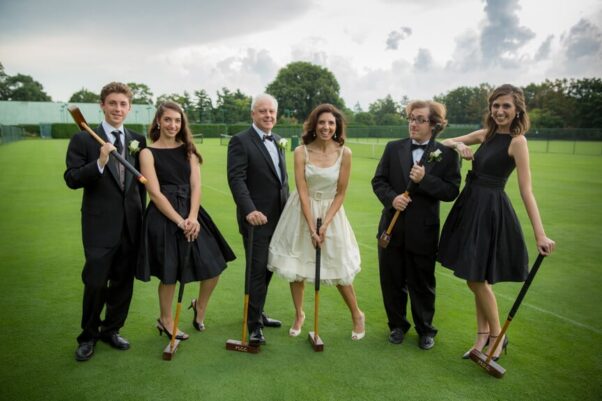
I like to write. I’m not writing more books right now, but I just finished my first screenplay. It’s a lighthearted romance movie.
I also love to windsurf at Marsh Creek and play tennis. I enjoy playing the piano, drawing, and painting. I love to sing, but much to my husband’s dismay, I possess little to no singing ability. Truth be told, as much as I try so hard to improve, I’ve been “let go” from singing lessons I was paying for . . . twice.
My favorite time is the time I spend with my husband Brian, my grown daughters Stephanie and Veronica, and stepsons Ben and Matt.
What about reading – do you read much?
I wouldn’t characterize myself as a reader. People find that hard to believe given my career and because I’m a writer, but I’m a slow reader because I picture every word. In my defense, I love listening to books on tape.
What’s a big thing you’ve changed your mind about recently?
As a child and young adult, I was sensitive about how I grew up feeling different than everyone else. Sometime during the last five years, my attitude shifted from wondering, “What if I grew up in a different manner?” to understanding and respecting that my mom and dad did their best given their set of circumstances.
I lost both my parents to Alzheimer’s disease. I watched my mom take care of my father with such grace. Then when she was diagnosed, I spent an extraordinary amount of time caring for her. Seeing both of my parents in a vulnerable state changed my perspective because I had the time to consider what it must have been like for them growing up in the Depression.
Dad came over from Greece at age 16 without a high school education and not speaking English, yet somehow provided our family with a home and access to college educations.
Mom, who lost her father when she was 11, passed up a full-ride college scholarship to help care for her mother, who could not speak English, and her four brothers. How amazing they were, and they did the best they could possibly do raising my sister and me.
Everyone has their own story, and I’ve realized how important it is to listen and consider responses and reactions based on their particular circumstances. It took me a long time to give up trying to rewrite history. I’m sure I’ll always run into challenges, but I believe I can fully embrace differences with acceptance and respect.
In a crazy world, Ellen, what keeps you hopeful and optimistic?
I am an optimist at heart. Being curious, open to learning new things, and discovering better ways to do things keeps me hopeful about the future whether we’re talking about business, politics or our planet.
Finally, Ellen, what’s the best advice you’ve ever received?
I keep a sticky note on a bulletin board in my office that reads, “More than this moment.” If everything’s going funky, I look at it and remind myself, “Life is more than this moment.” It just grounds me.
Another concept I believe in is the philosophy of wabi-sabi. It means, “Nothing is perfect, nothing is permanent, nothing is finished.” It’s a way of finding beauty within imperfections and accepting the natural cycle of life. It relates to what I just told you about my mom and dad. And, during the pandemic, it was an especially grounding philosophy because I felt, this isn’t forever. Nothing is permanent, but realize, neither are we.
It’s the same thing with perfection. You can work and work and work on your presentation, ad copy, or a book, but it’s important to realize that you’re never going to achieve perfection.
Join Our Community
Never miss a Delaware County story!
"*" indicates required fields









![95000-1023_ACJ_BannerAd[1]](https://delco.today/wp-content/uploads/sites/3/2023/03/95000-1023_ACJ_BannerAd1.jpg)



















